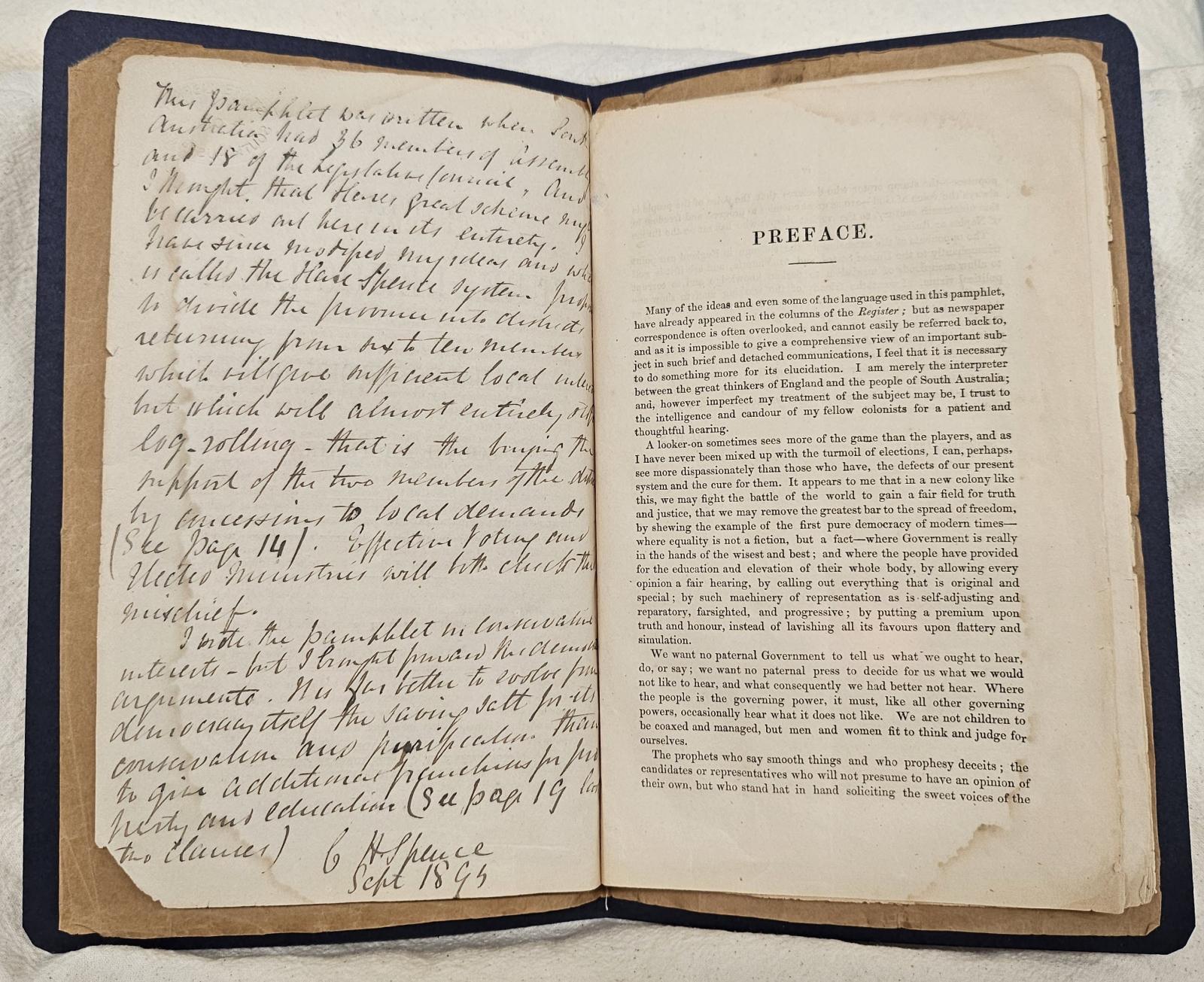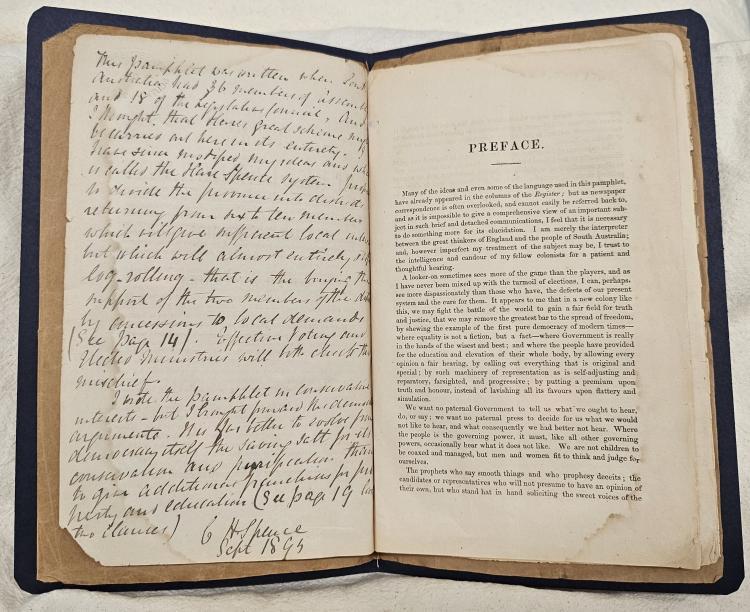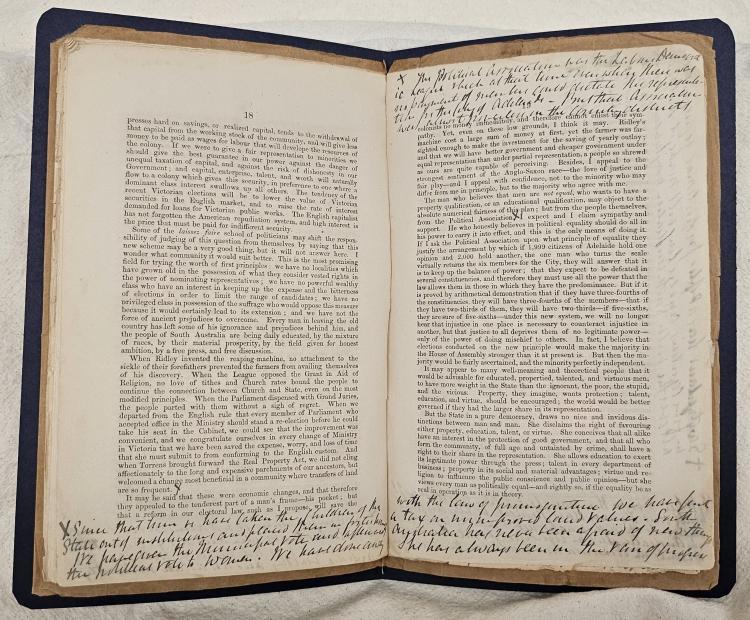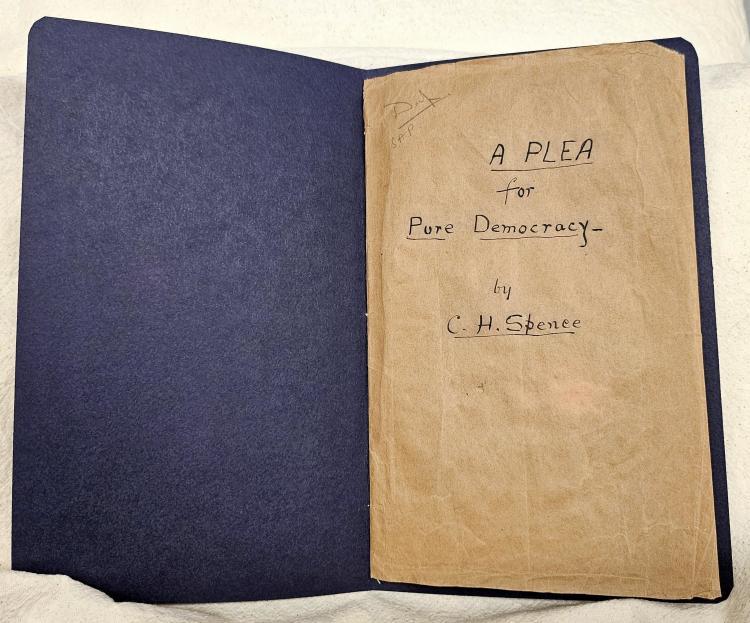Temporary change to collection access from March
-
What's On
- Events
- Exhibitions
- Tours
-
Kids and families
- Australian Rules Football in books
- Board games from the past
- Bugs and Insects
- Build a bug
- Create Futuristic Fashion that is Out of this world!
- Create your Ultimate Party Menu
- Design your Dream Holden
- Make your (book) mark at home
- Millie Mak the Maker
- Out on the Town with Keifee the Koala
- What's in Pig's Suitcase?
- Students and teachers
- Collections
- Research
- Stories
- Visit us
- About Us
- Get involved

The State Library of South Australia has existed in various forms since the establishment of the South Australian Literary Association on 29 August 1834, and the subsequent arrival of a trunk full of books on 18 December 1836.
The Library has been continuously collecting in the years since and it’s not uncommon for today’s staff to come across a variety of discreet treasures within the stacks. Many of these items may not have been notable at the time of collection but have become more significant as the years pass.
Here at the State Library, our Collection Storage and Care team are dedicated to looking after our collection security and preservation needs, as well as facilitating access for our customers. During a recent project to improve the findability of our collection of South Australian pamphlets the team found a treasure, featuring an important figure in South Australia’s history.
Nestled within a small green box in an unassuming beige envelope was A plea for pure democracy, written by Catherine Helen Spence and published in 1861. The work is a 24-page commentary on British lawyer, Thomas Hare’s proposals to reform voting as could be applied in South Australia. The proposal introduced the single transferable vote system of proportional representation, which is still used in State and Federal elections in Australia today.
While the State Library holds several copies of this pamphlet, this one is particularly unique due to the handwritten annotations found throughout the pages, written by Spence in 1895, over 30 years after publication. The catalogue record contained a single note “annotated.”
Spence's annotations
On the verso of the title page, Spence details her thoughts on the original pamphlet, reflecting on how her views had changed in the thirty years since publication.

'This pamphlet was written when South Australia had 36 members of Assembly and 18 of the Legislative Council, and I thought that Hare’s grand scheme might be carried out here in its entirety.
I have since modified my ideas into what is called the Hare Spence system, further to divide the province into districts returning from six to ten members which will give sufficient local interest, but which will almost entirely stop log-rolling - that is the buying the support of the two members of the district[s] by concessions to local demand (See page 14) Effective voting and elected ministries will both check this mischief.
I wrote the pamphlet in conservative interests – but I brought forward the democratic arguments. It is far better to evolve from democracy itself the saving salt for its conservation and purification than to give additional [practices] for property and education.' ~ Catherine Helen Spence, 1885.
While many today would shudder at the prospect of ‘defacing’ a book by writing in it, it was a common practice in the past for book owners to routinely write notes, comments, corrections, and even draw throughout the margins of their books. Such annotations provide historians, researchers, and bibliographers an intimate look into the lives, thoughts and opinions of the former owners of these items.

Preserving the past for future generations
The nature of pamphlets like these can make them very difficult to care for. They were made cheaply, to be sold cheaply, and as such were never intended to be kept long term. The fact that this item remains intact after nearly 150 years is outstanding and gives us insight into Catherine’s views on the development of democracy in South Australia and how those views changed over time.
The pamphlet was worn and well used, having long ago lost its original cover, replaced with simple brown paper for protection and identification. While it’s journey from Catherine’s hands to ours is unknown, it serves as a reminder that even things that appear plain and ordinary on the outside, can turn out to be extraordinary on the inside.
To help ensure this treasure remains accessible into the future, our Senior Conservator Peter Zajicek, has given it a new protective cover, securing the loose pages in the process.

The pamphlet also been digitised and will soon be available to view online directly through our catalogue, in the meantime, you can check it out here.
About Catherine Helen Spence
Born in 1825 in Scotland, Catherine migrated with her family to South Australia in 1839. Initially a fiction writer, Catherine would be the first women to write a novel about Australia titled: Clara Morison: a tale of South Australia during the gold fever in 1854. While she would go on to write several other novels, she would eventually shift her focus to other pursuits, including social and political commentary.
![Catherine Helen Spence [B 46492]](/sites/default/files/styles/wysiwyg_embed/public/2018-05/CatherineHelenSpence-B46492_0.png?itok=9bEVebbH)
In 1859, Catherine took a particular interest in the electoral reforms proposed by Thomas Hare. While she initially tried submitting her thoughts on the reforms to The Observer, she would be dissatisfied with the limitations of this format and instead tried another approach. In a letter to the editor published in the Kapunda Herald in 1895 she reflected on her reasons for producing the pamphlet:
“Sir—In 1861 I published in Adelaide " A Plea for Pure Democracy: Mr. Hare's Reform Bill applied to South Australia." The reason why I went to this trouble and expense—for, of course, nobody bought the shilling pamphlet, I had to give it away, and people thought they did well when they read it—was because I could not get my letters published in the Observer unless they were too short to show the bearings of the reform”
The letter to the editor also noted why she chose to take up public speaking and advocacy.
'But when the first time in Australia we had two clearly defined parties, who were marshalling their forces against each other for victory or defeat, I left the position of an occasional anonymous writer in the press for that of a public speaker on any platform open to me. The work needed to be done, and I took heart and tried to do it myself. For a woman to go about lecturing on any subject but temperance and Christian endeavor was an innovation in Australia. For one who had no vote—one who was classed in law with minors, idiots, lunatics, and criminals, to travel round the country exhorting male voters to mend their methods and adopt a reform which no country in the world had legalised, except one small Swiss canton, was bold, if not audacious. "Better keep to domestic and philanthropic work, and leave men to manage their own affairs," was, no doubt, the opinion of most of my fellow citizens. But to our own conscience we must be true, and the message delivered to me in 1859 was too important in my estimation to be neglected.' ~ 'CORRESPONDENCE.', Kapunda Herald (SA : 1878 - 1951), 24 May 1895
Catherine’s contributions to South Australia, politics and women’s suffrage are still remembered today, with the electoral district of Spence named in her honour, as well as the State Library’s central building – known as the Spence Wing.
Written by Marie Larsen, Collection Maintenance Officer, Preservation
Explore more
You can learn more about Catherine Helen Spence by reading her biographies, available in the library or online:
Catalogue record: A plea for pure democracy: Mr. Hare's Reform Bill applied to South Australia, by C.H.S.
Catherine Helen Spence research guide
- Spence, Catherine Helen, 1825-1910, ‘Ever yours, C.H. Spence: Catherine Helen Spence's An autobiography (1825-1910), diary (1894) and some correspondence (1894-1910)’ (Kent Town, S. Aust. : Wakefield Press, 2005)
> Available on the shelf in the SA Ready Reference collection at 994.2303 S744 - Susan Magarey, ‘Unbridling the tongues of women: a biography of Catherine Helen Spence’ (Adelaide: University of Adelaide Press, 2010)
> Available on the shelf in the SA Ready Reference collection at 829.3 S744.M - Susan Eade, 'Spence, Catherine Helen (1825–1910)', Australian Dictionary of Biography, National Centre of Biography, Australian National University, published first in hardcopy 1976.
Related Stories